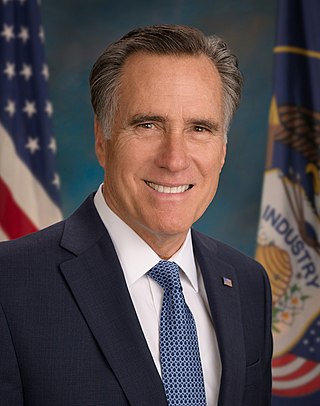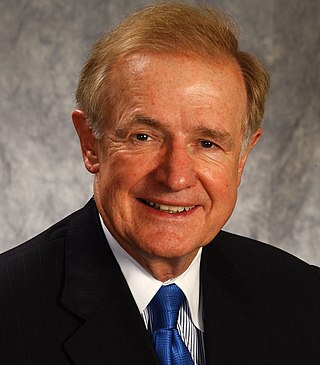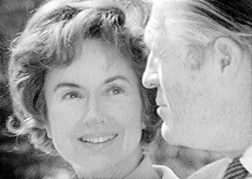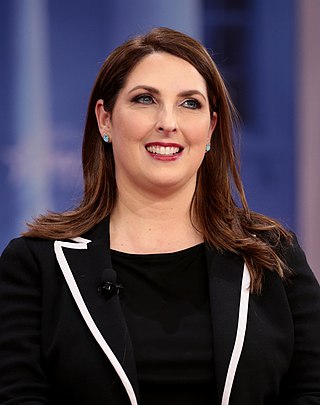
Philip Aloysius Hart was an American lawyer and politician. A Democrat, he served as a United States Senator from Michigan from 1959 until his death from cancer in Washington, D.C. in 1976. He was known as the "Conscience of the Senate". The Hart Senate Office Building is named in his honor.

George Wilcken Romney was an American businessman and politician. A member of the Republican Party, he served as chairman and president of American Motors Corporation from 1954 to 1962, the 43rd governor of Michigan from 1963 to 1969, and 3rd secretary of Housing and Urban Development from 1969 to 1973. He was the father of Mitt Romney, who serves as one of the United States senators from Utah and formerly was a governor of Massachusetts and the 2012 Republican presidential nominee; the husband of 1970 U.S. Senate candidate Lenore Romney; and the paternal grandfather of former Republican National Committee chair Ronna McDaniel.

Willard Mitt Romney is an American politician, businessman, and lawyer serving as the junior United States senator from Utah since 2019. He served as the 70th governor of Massachusetts from 2003 to 2007 and was the Republican Party's nominee for president of the United States in the 2012 election.

Donald Wayne Riegle Jr. is an American politician, author, and businessman from Michigan. He served for five terms as a Representative and for three terms as a Senator in the U.S. Congress.

The 1994 United States Senate elections were held November 8, 1994, with the 33 seats of Class 1 contested in regular elections. Special elections were also held to fill vacancies. The Republican Party took control of the Senate from the Democrats. Like for most other midterm elections, the opposition, this time being the Republicans, held the traditional advantage. The congressional Republicans campaigned against the early presidency of Bill Clinton, including his unsuccessful healthcare plan. Democrats held a 56–44 majority, after having lost a seat in Texas in a 1993 special election.

The Romney family is prominent in U.S. politics. Its family members include George W. Romney (1907–1995), the 43rd Governor of Michigan (1963–1969), and his son, Mitt Romney, who was the 70th Governor of Massachusetts (2003–2007), the 2012 Republican U.S. Presidential nominee, and is currently a U.S. Senator for Utah. George W. Romney's father was Gaskell Romney (1871–1955), and his mother was Anna Amelia Pratt (1876–1926). Anna's grandfather was the renowned early Latter-day Saint apostle Parley Parker Pratt.

Lenore LaFount Romney was an American actress and political figure. The wife of businessman and politician George W. Romney, she was First Lady of Michigan from 1963 to 1969. She was the Republican Party nominee for the U.S. Senate in 1970 from Michigan. Her younger son, Mitt Romney, is a U.S. senator from Utah, a former governor of Massachusetts, and was the 2012 Republican presidential nominee.

The 1994 United States Senate election in Massachusetts was held November 8, 1994. Incumbent Democratic U.S. Senator Ted Kennedy won re-election to his seventh term, defeating the Republican nominee, businessman Mitt Romney.

Ann Lois Romney is an American author and philanthropist. She is the wife of businessman and politician, Senator Mitt Romney of Utah. From 2003 to 2007, Romney was First Lady of Massachusetts, while her husband served as governor.

Ronna Eileen Romney is an American Republican politician and former radio talk show host.

George Romney ran for the 1968 Republican Party nomination in the 1968 United States presidential election.

Jerry D. Roe is currently an adjunct professor at Lansing Community College and is best known for his 10-year stint from 1969 to 1979 as the executive director of the Michigan Republican Party. Roe is sometimes called "Mr. Republican" and was declared a Michiganian of the Year by the Detroit News in 1986. He is the father of Jason Roe, former chief of staff to United States Representative Tom Feeney and former deputy campaign manager of the 2008 presidential primary campaign of Mitt Romney.

This is the electoral history of Barack Obama. Obama served as the 44th president of the United States (2009–2017) and as a United States senator from Illinois (2005–2008).
The following is a timeline of major events leading up to the United States presidential election of 2012. The election was the 57th quadrennial United States presidential election held on November 6, 2012.

The 1994 United States Senate election in Michigan was held November 8, 1994. Incumbent Democratic Senator Don Riegle decided not run for re-election. Spencer Abraham won the open seat, becoming the first and so far only Republican to win a U.S. Senate race in Michigan since Robert P. Griffin in 1972 and the first to win the state's Class I seat since Charles E. Potter in 1952. As of 2024, this is the last time that a man won the Class 1 Senate seat in Michigan, and the last time in general that a Republican was elected to a U.S. Senate seat in Michigan.

The 1976 United States Senate election in Michigan took place on November 2, 1976. Incumbent Democratic U.S. Senator Philip Hart decided to retire instead of seeking a fourth term because he had terminal cancer. Republican turned Democrat Representative Donald Riegle won the open seat, keeping it in Democrats' hands despite Gerald Ford's victory in the concurrent presidential election.

The 2012 United States presidential election in Michigan took place on November 6, 2012, as part of the 2012 United States presidential election in which all 50 states plus the District of Columbia participated. Voters chose 16 electors to represent them in the Electoral College via a popular vote pitting incumbent Democratic President Barack Obama and his running mate, Vice President Joe Biden, against Republican challenger and former Massachusetts Governor Mitt Romney and his running mate, Congressman Paul Ryan.

The 2018 United States Senate election in Utah took place on November 6, 2018, to elect a member of the United States Senate to represent the State of Utah, concurrently with other elections to the United States Senate, elections to the United States House of Representatives, and various state and local elections. The primaries took place on June 26.

Ronna Romney McDaniel is an American political strategist who served as chair of the Republican National Committee (RNC) from 2017 until her resignation in 2024. A member of the Republican Party and the Romney family, McDaniel was chair of the Michigan Republican Party from 2015 to 2017.
Events from the year 1968 in Michigan.























